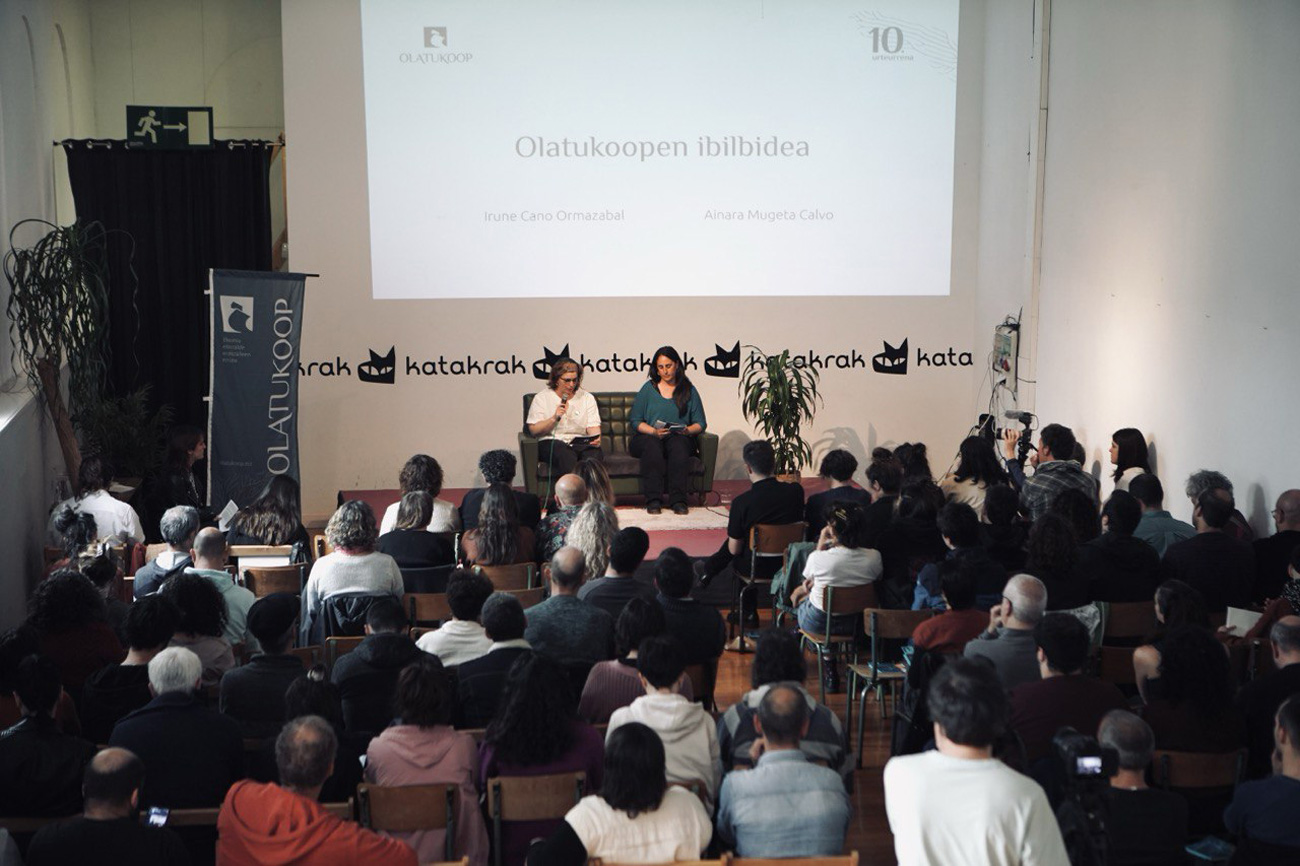
- About 80 people have met in the Katakraken Hall in Pamplona to celebrate the ten years of the Olatukoop network, a reference to the transformative social economy. It has been an initiative to present detailed proposals for economic and territorial transformation.

Gift of a book on each chair: Transformative economies. A proposal for economic and territorial transformation. It consists of Oscar García and other members of the Olatukoop network. Based on experiences acquired over ten years, it collects the evolutions and new proposals within the theory and model of the Transformative Social Economy (ESE), always focused on the future, "for the future, to be a fertiliser to build an economy for life". In fact, unlike the hegemonic capitalist and neoliberal system, this economy seeks more stimulating and beautiful lives.
To this end, they created Olatukoop in 2014 and have since progressed step by step, learning by making and extending what they learned to others: "We don't have magic formulas, but we have tools and practices to walk the way," said Leire Udabe Aizpurua to the gummies present. Since its beginnings, training has been of great importance, and the gift book is another proof of the desire to expand knowledge. Nor can we ignore the KoopFabrika cooperative entrepreneurship school. Ten years of work by Urko Apaolaza, reporting for a more prosperous life for all.
In this sense, some bases have been established, which have been adapted to what has been advanced, which are: to situate work in the context of the life project, to focus practices that positively affect the habitability of life, to place the economy at the service of life independently, to base self-formation and non-economic relationships, to guarantee the ownership and collective control of productive resources and of the processes of social cooperation of the economy,
Olatukoop, founded in 2014 by a dozen agents and ten years later, the network brings together over 60 cooperatives, civic associations and cooperative socio-economic actors, including ARGIA, with a total of 600 workers and hundreds of other partners. Every year and step by step, Beñat Irasuegi Ibarra wanted to underline the "legitimacy achieved through practice". As usual, they haven't always had an easy and quiet road, and they've had to face some arguments and obstacles -- but they're clear: "It's been beautiful."
Olatukoop's is a path of intercooperation, collective work and networks: "We are not going anywhere, and in terms of transformation, much less", as Udabe warns. This penetration was perfectly reflected by members of the structures Gezki, Lanki, Eskubide Sozialen Karta, Emagin, Katakrak, Koop57, Amillubi and Invisible Ciutat (videos).

Jump to territorial action
As this network of agents from all over Euskal Herria began to be woven, the attendees were asked to make a leap towards "territorial action": "We want to create projects, share and develop independent territories, without looking and leaving no one behind territorial relations from solidarity. Our modest utopia is that rhizomes form trees, and trees create habitable forests." Gorka Julio Hurtado stressed that this rhizome that will become a forest must be a "unit of diversity".
Katakrak’s event was also the time to learn about some of the instruments available to him. To mention one, we have the KoopFabrika initiative from KoopFabrika from the South, created by the Enaras cooperative, in collaboration with Huhezi and Olatukoop. Its objective is to provide migrants with a cooperative tool and a transformative social economy to organize their work and improve their life projects.
Call to keep opening cracks
With the aim of an economy for life, the ten years reaffirmed the desire to continue "opening cracks". The book in hand, because they look to the future: "They don't allow us to think about what the economy is. This book and Olatukoop are economics, and also a hammer, a hammer to break the current sad social economic system," says Irasuegi. Looking at Biharra, they have many identified and defined challenges, all of which are potolos, proof that Olatukoop is strong and enthusiastic.
On the one hand, the network intends to position itself as an agent facing the rise of the right tip: "In this dark context, with fascism here, the transforming social economy must be a central element to fight it". On the other hand, they aim to create an ESE confederation between the different territories of the Basque Country, as well as the integration of Udalbiltza and/or public administrations in the strategy of transformative social economy. In addition, they have to deal with the lack of transmission of houses, bars, art houses and typical shops of the people, which have been indispensable for the community: "The agents who have made us live in our peoples are disappearing. The ESE has its place to make it collective and community responsibility". In this sense, the public cooperative can be an interesting solution. The latter is a popular socio-economic framework that, although citizenship predominates, integrates social economy actors, including civil society and public institutions. Finally, the issue of digitization, which occupies more and more space in our lives, is also a priority issue, with the aim of incorporating the objective of sovereignty.
Irasuegi concluded the initiative by stressing the need to bring all this of pleasure or remembering a legend from Rosa Luxembourg: never forget to enjoy timid and beautiful things.